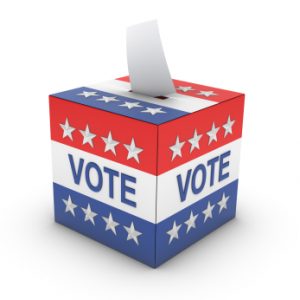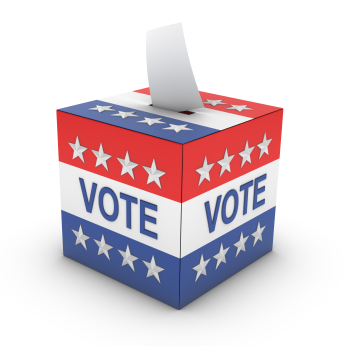3 Classmates Advance Bipartisan Electoral College Reform
Group Seeks to Restore “Power To The People”
(Update from the campaign: March 6, 2018)
- Several Class of 1969 members are active and involved, and more are welcome.
- Everyone is working hard to pass the Interstate Compact in Connecticut.
- If interested generally or in helping with Connecticut or other state-level campaign, sign up on the https://makingeveryvotecount.com/ websiter and/or send an email to Reed Hundt. (Press the “Email This Classmate” button on Reed’s Profile page to send him an email.)
——————-
(original post)  Palo Alto, CA, Oct. 7, 2017: Making Every Vote Count (MEVC) — a new, national group co-founded by our own Reed Hundt (DC and former Chairman of the FCC) and dedicated to reforming the Electoral College — got significant support for its key arguments from a new research published today.
Palo Alto, CA, Oct. 7, 2017: Making Every Vote Count (MEVC) — a new, national group co-founded by our own Reed Hundt (DC and former Chairman of the FCC) and dedicated to reforming the Electoral College — got significant support for its key arguments from a new research published today.
Hundt (a former FCC Chairman) was joined by fellow Board members Fred Goldberg (MC and former IRS Commissioner) and Richard Tedlow (MC and ex-Harvard Business School professor) in making the announcement.
MEVC is building on the decade-long work of the National Popular Vote, a 501(c)(4) NGO that is supported FairVote and numerous other civil society participants. Under the National Popular Vote Interstate Compact (NPVIC), electors from a participating state vote for the candidate who has the most national votes. The Compact goes into effect once states representing 270 electoral votes have passed the measure. To date, ten states and the District of Columbia have passed the Compact, representing 165 of the necessary 270 electoral votes.

“We are standing on the shoulders of giant efforts in the past,” said Hundt. “Now only 105 (out of a potential 373) more electoral votes need to be bound by this law to cause the national popular vote to choose the President.” Launching today at its symposium at Stanford, Making Every Vote Count will complement existing efforts to engage in a national education and communication campaign to encourage state legislatures to pass the NPVIC. Its East Coast launch will occur in Washington, D.C., at the National
Press Club on October 12.
“A national popular vote system would address many of the root causes of dysfunction in the political process at a state and federal level. It would bring everyone in the country into participation and encourage consensus-building on critical issues,” Hundt said.
The research released today by Making Every Vote Count is based on analysis by Princeton Professor Sam Wang and data scientist Vinod Bakthavachalam. The two scientists based the findings of their report on voting trends from every Presidential election in our nation’s history and a simulation model applied on a going forward basis.
Speaking at a summit today at Stanford University, Wang said “Our new analysis shows that in close elections, one in three future Presidents will have lost the popular vote. Republican and Democratic candidates both have sizable chances of winning the popular vote but not gaining the Presidency.” Here is a copy of Wang’s presentation.
The probabilities cause both major party candidates principally to campaign in as few as five states, containing as little as 20% of the voters. They take for granted or ignore most voters, most states, most regions and most communities. The lack of equal weight among all voters causes campaigns to ignore whole demographics who happen to reside outside of those states. For example, because most Mormon families have settled in several Western non-swing states, they have just 12% of the ability to influence a Presidential election as the average American.
“Because voters are ignored in so many states,” says Prof. Wang, “whole constituencies are frozen out of the selection process simply because of where they live. In an example that is relevant today, a single voter in Pennsylvania or Michigan has more impact on the Presidential outcome than twenty Americans of Puerto Rican descent in other states.”
In addition, MEVC revealed a poll by Claster Consulting showing a broad and deep consensus that the current system is broken:
- 79% of Americans agree that it’s bad for the country that candidates focus their attention on battleground or swing states and do not visit, encourage registration or get out the vote in most states.
- 77% of Americans agree that candidates should be incentivized to campaign in every state rather than just a few swing or battleground states.
MEVC will be building state-by-state support for the reform on a bipartisan basis. Not only is the board composed of prominent Republicans and Democrats but supporters include former Transportation Secretary Ray LaHood, a Republican, and former Labor Secretary Robert Reich, a Democrat.
More information is available at makingeveryvotecount.com, and interested parties can get involved or make a donation.


Thank you, Reed, for your part in Making Every Vote Count.
Here is one critical, non-partisan issue that we should all support: one man, one vote. And every vote to count. So count me in.
What you three are doing is fantastic. Please let me know what I can do to help. I saw no publicity or news coverage of the October 12 East Coast launch and would love to see anything that appeared. Thanks!